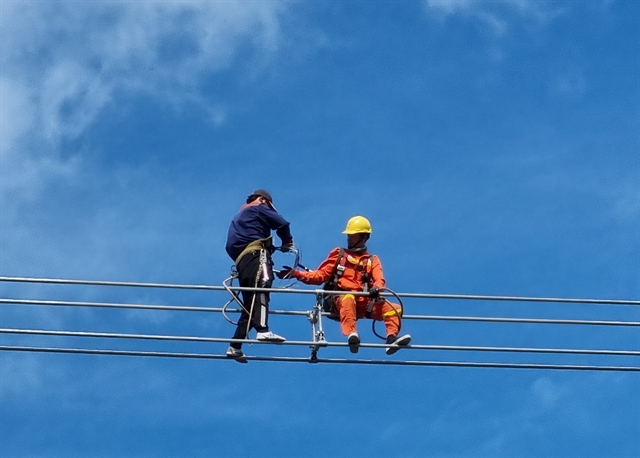An inspection revealed that the EVN was slow in its investment and completion of power sources and grids. It was also sluggish in addressing issues with turbines at numerous thermoelectricity plants from 2021 to 2023.

That is the result of the inspection that MoIT has carried out at the request of Prime Minister Pham Minh Chinh after several serious power shortages in the North at the end of May.
A warning concerning the threat of a power deficit, particularly in northern regions, was voiced several years ago. This forecast arose from the burgeoning demand for electricity and the delayed investment and construction of energy sources.
An inspection revealed that the EVN was slow in its investment and completion of power sources and grids. It was also sluggish in addressing issues with turbines at numerous thermoelectricity plants from 2021 to 2023. These actions diminished the ability to provide sufficient electricity, thereby weakening energy security reserves.
Further scrutiny by inspectors revealed the unequal operation of the power system, primarily in the procurement of energy sources during certain periods. The protocol for the national power system operation during the dry season of 2023 was not adhered to. This neglect led to widespread interruptions to power supply, predominantly in the North, from late May to mid-June.
These abrupt, unpublicised power outages caused public concern and heavily disrupted daily life, commercial production, and businesses, tarnishing the investment climate.
In response to these infringements by EVN, the Ministry of Industry and Trade called upon the Committee for Management of State Capital at Enterprises (CMSC), responsible for managing State capital at EVN, to identify and attribute culpability and to propose or implement remedial actions for members of EVN’s executive boards and other individuals.
EVN was instructed to set out the responsibilities of its board of directors and relevant advisory panels, with a view to establishing or suggesting appropriate sanctions.
At present, EVN controls a significant 38 per cent of the power supply source, while the remainder is overseen by the Viet Nam National Coal – Mineral Industries Holding Corporation Limited (TKV), Viet Nam Oil and Gas Group (PVN), build-operate-transfer (BOT) plants, and renewable energy facilities.
Moreover, the ministry directed TKV and PVN to identify responsibilities and introduce punitive measures for any transgressions in supplying coal and gas for power generation.
Furthermore, a clear mandate was given to EVN, PVN, and TKV to devise strategies to preclude power shortages in the foreseeable future.
On June 8, amid escalating tensions over electricity supply in the North, the Minister of Industry and Trade Nguyen Hong Dien approved a decision to form an inspection team at EVN. The inspection, spanning the period from January 1, 2021, to June 1, 2023, was initiated at a time of mounting unease.
Days after the launch of the inspection, EVN announced on June 15 the temporary suspension of the director of the National Load Dispatch Centre, Nguyen Duc Ninh, in a bid to expedite the inspection process.
On June 20, EVN requested the National Load Dispatch Centre and relevant departments to specify responsibilities for the power shortage.
From late May, Ha Noi and several northern provinces and cities were grappling with exceptionally high temperatures and power outages. Hydroelectricity, one of the North's two primary power sources, was hampered by low reservoir levels due to drought, and could not generate power as usual. Thermal power sources also encountered issues as some unresolved problems at turbines led to around 2,100 MW of power not being generated.
The power deficit was an urgent issue. In early June, businesses in industrial zones in Bac Ninh, Ha Noi, and Bac Giang reported power outages lasting for hours on end over a week's period.
In a recent business confidence index report, European companies reported being adversely affected by the power shortage. While the situation has improved somewhat due to heavy rains, around 60 per cent of respondents said that the power shortage posed significant challenges, with 10 per cent reporting severe impacts.
In a report to the Government in late June, EVN noted that power demand in the North was increasing at an average rate of 10 per cent annually, equivalent to approximately 2,400 – 2,900 MW. New power sources expected to come online in 2024 and 2025 would only generate 780 MW and 1,620 MW respectively, satisfying just 30-50 per cent of the increase in demand each year.
EVN warned that the North's power supply would continue to struggle in 2025, especially during the dry season. — VNS





